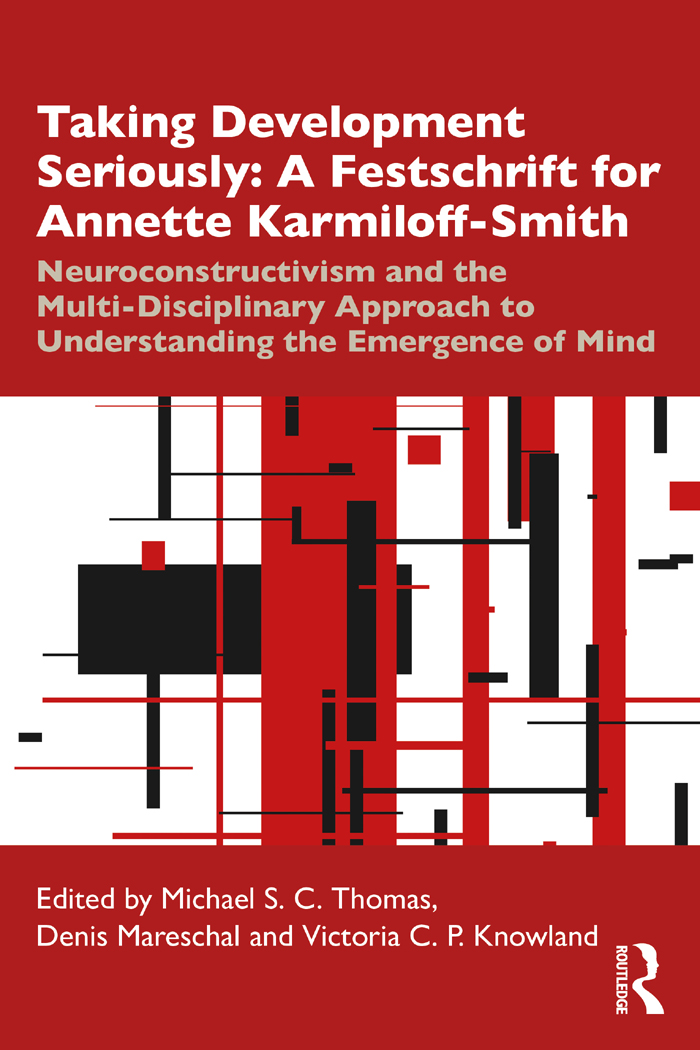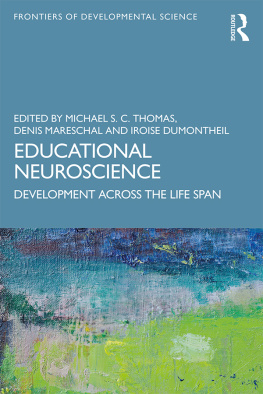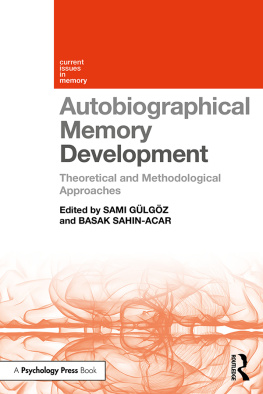
Michael S. C. Thomas, Denis Mareschal, and Victoria C. P. Knowland
Professor Annette Karmiloff-Smith was a highly influential developmental and cognitive scientist who made significant contributions to our understanding of typical and atypical development. She was born 18th July, 1938, and passed away 19th December, 2016, aged 78. Annette was a seminal thinker in the field of child development and the recipient of many awards. These achievements include elected member to Academia Europaea (1991); Fellow of the British Academy (1993); British Psychological Society Book Award (1994) for Beyond Modularity: A Developmental Perspective on Cognitive Science; elected Fellow of the Academy of Medical Sciences (1999); European Latsis prize for Cognitive Science (2002; one of only two women to achieve this accolade); Commander of the British Empire (CBE; 2004) for services to cognitive development; elected Fellow of the Cognitive Science Society (2008); Lifetime Achievement award, British Psychological Society (2009); honorary doctorate from the University of Amsterdam (2010); Mattei International Prize for Psychological Sciences, Union Psychological Society (2012); William Thierry Preyer Award for Excellence in Research on Human Development, European Association of Developmental Science (2017; joint with Mark Johnson); British Psychological Society Distinguished Contributions Award (2017).
As the British philosopher Maggie Boden describes her, Annette was theoretically deep and experimentally ingenious. Her work highlighted fundamental questions about the nature and origins of representation in various domains (language, vision, physical action). She combined psychological theorising with computational modelling, clinical investigations, andpartly inspired by her husband Mark Johnsoncognitive neuroscience, too.
One of the final book projects that Annette set in motion, shortly before she passed away in 2016, was the publication of her collected papers (, Thinking Developmentally from Constructivism to Neuroconstructivism: Selected Works of Annette Karmiloff-Smith). The current volume should be seen as a companion to that book, in that it brings together many of the researchers, collaborators, and students who worked with Annette, to show how her ideas have influenced and continue to influence their own research. The chapters provide a mix of cutting-edge science and reminiscence, providing a fascinating insight into the historical contexts in which many of Annettes theoretical insights arose, including such ideas as the microgenetic approach, representational redescription, and neuroconstructivism. The chapters also provide updates about how earlier theoretical ideas have stood the test of time, and present unpublished data from the early years of Annettes career.
Annette began her scientific career in Geneva, Switzerland. She was working as a simultaneous interpreter for the United Nations, but was bored because she was always repeating other peoples thoughts and was not allowed, as interpreter, to have any of her own. She decided to go back to university and was exploring a local bookshop for inspiration when one day, she caught sight of Jean Piaget, whose photo she recognised from a textbook. She followed him back to the university buildings, deciding then to audit his course. Her eyes were opened. To her, Piagets approach to development offered so much more than observation. It included epistemology, logic, philosophy of mind, and the philosophy of science. It was there that she discovered her absolute passion for research.
Annette went on to complete her PhD at the University of Geneva in Piagets International Centre for Genetic Epistemology, under the supervision of Brbel Inhelder and Hermine Sinclair-De Zwart, successfully defending her thesis in 1977. Her first article If you want to get ahead, get a theory! was published in 1975 (, p. 196).
Her work on cognitive and language development led her towards key insights in how psychological nativism, and particularly Jerry Fodors thesis that the mind is composed of innate modules (, p. 695). Emergent specialisation would be complemented by representational redescription, with sharing of information occurring beyond mastery of skills to generate the (perhaps unique degree of ) cognitive flexibility observed in humans. With some prescience, Annette argued that the degree of specialisation in the infant would only be established with the emergence of technologies for measuring on-line brain activation with neonates and young infants.
After a number of years working on typical development, with a two-year gap working in the Palestinian refugee camps in Beirut, in 1982 she moved to London to the Medical Research Councils Cognitive Development Unit. There, several colleagues were working on autism and Down syndrome, which stimulated her interest in atypical development.
In 1998, she set up her own MRC-funded Neurocognitive Development Unit at the Institute of Child Health in London (which subsequently became part of University College London). By then, she was convinced that the study of development had to embrace a multidisciplinary approach, combining research at several levels of description, including genes, brains, cognition, behaviour, and the environment. This was reflected in her co-authorship of the influential book, Rethinking Innateness: A Connectionist Perspective on Development, published in . Her new unit brought together researchers using behavioural methods, brain imaging, genetics, and computational modelling (particularly Parallel Distributed Processing/connectionist approaches), to study infants, children, adolescents and adults. The primary focus was on developmental disorders, including seminal work on the rare genetic disorder Williams syndrome.
Annette developed an approach called neuroconstructivism, to integrate Piagetian theory with new findings on functional brain development. An understanding of developmental mechanism was again to the fore, as in her 1998 paper, Development itself is the key to understanding developmental disorders. She argued that what seems to be the natural organisation of the brain in adults is actually a result of development itself developmental disorders are not the knocking out of specific abilities but affect the dynamics of neurodevelopment, as the child interacts with the world. Early low-level differences in infancy have potentially cascading effects across development. In terms of experimental design, she emphasised the need for longitudinal studies to chart the process of development, and advocated research that spanned different developmental disorders and different emerging domains. To study development disorders, one had to take the process of development seriously.
After joining Birkbeck, University of London, as a Professorial Research Fellow in 2006, her work focused on understanding the complex epigenetic interactions involved in brain organisation across early development. Her final Wellcome-Trust-funded research project was part of the interdisciplinary London Down Syndrome (LonDownS) Consortium, which combined researchers at University College London, Birkbeck, and Kings College London. The project used Down syndrome (DS) as a model for Alzheimers Disease. It brought together a multidisciplinary team of human geneticists, cellular biologists, psychiatrists, psychologists, neuroscientists, and mouse geneticists, with the goal of investigating potential early risk and protective factors for the emergence of dementia in DS. Annettes focus was to link variation in early development in DS with differences in the risk of dementia, a condition that is elevated in adults with the syndrome. What Im doing is kind of counterintuitive, she said of the project. Im arguing that we can study babies to understand Alzheimers disease in adults (). As ever, the framing was intended to encourage researchers to increase their focus on mechanisms of change.
Next page





